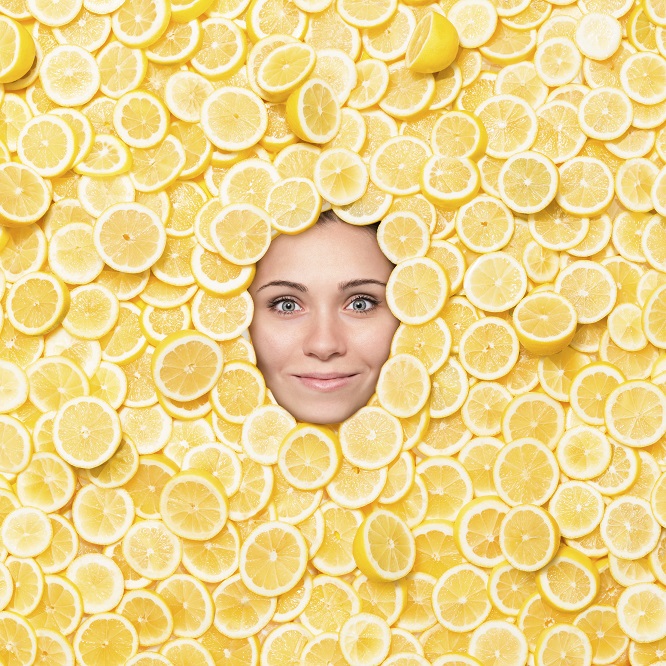 Acne home remedies are one of the biggest minefields around. Some insist that every last one is a threat to your skin, some insist that a hidden miracle could be in your cupboard right now.
Acne home remedies are one of the biggest minefields around. Some insist that every last one is a threat to your skin, some insist that a hidden miracle could be in your cupboard right now.
As you would expect, the real picture is far more complex, and interesting too. There’s many excellent home remedies; one example is turmeric powder, which was shown in this study to reduce oily skin by 24.67% after four weeks. It started as a home remedy; it later became official.
But other home remedies are deadly for acne and recommended simply based on word of mouth. The fact is that foodstuffs like lemons and eggs have far more complex, significant compounds than a claim of “soothes irritated skin” would suggest. A food or oil could be more beneficial than you realise, or a whole lot worse.
To avoid getting knocked off course in your quest to clear acne, here are 9 home remedies which are not worth your time, effort and money.
Lemon juice
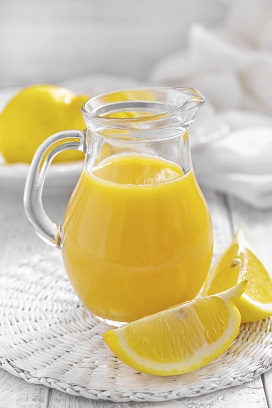 The freshly squeezed juice of lemon is an ingredient in almost every homemade skincare recipe around – honey, yoghurt, cinnamon masks, you name it. But it’s by far one of the worst natural topical treatments in existence.
The freshly squeezed juice of lemon is an ingredient in almost every homemade skincare recipe around – honey, yoghurt, cinnamon masks, you name it. But it’s by far one of the worst natural topical treatments in existence.
The extremely low PH due to the citric acid is said to be a bacteria killing benefit, but is actually likely to irritate your skin. Lemon juice has a PH of 2.5 on average; human skin needs a PH of 4.5-5.5 to function properly.
A much less known problem is the furocoumarin compound in lemon juice called psolaren. When applied topically, psolaren has been proven to increase your sensitivity to UV radiation in sunlight. That means more irritation and inflammation of acne in the summer, and less time spent outside enjoying yourself.
Read Annihilate Your Acne – learn to prevent acne and stop just treating it!
The photosensitising effects of lemon juice are known but many believe this to be a rogue reaction. Wrong – the psolaren is a real compound which can lead to acne in all.
Last, but not least, lemon juice has no vitamin A, tiny amounts of vitamin C, and very little nutrition to speak of. One of its biggest claimed benefits is in reducing oily skin because of a compound called nobiletin, but the quantities are nowhere near high enough. Stay away from lemon juice!
Papaya
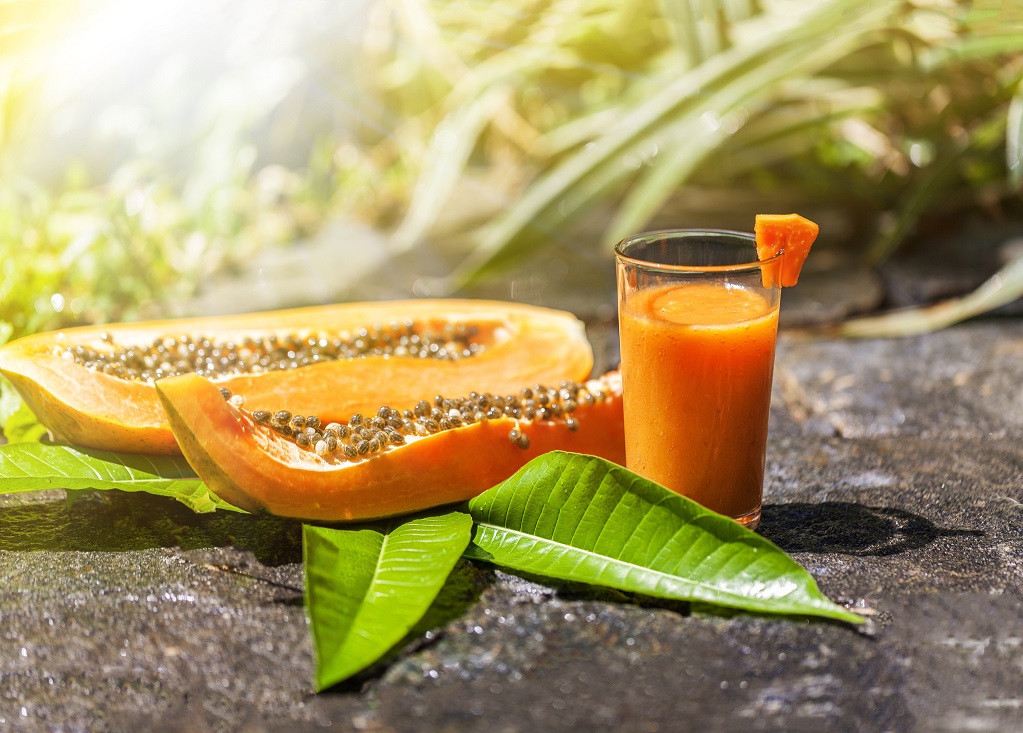 The papaya is a highly nutritious fruit. It contains 101% of the daily allowance for vitamin C per 100 grams and plenty of vitamin A as well. Its popularity as a home acne remedy is steadily increasing. However, there’s a huge downside – the papain.
The papaya is a highly nutritious fruit. It contains 101% of the daily allowance for vitamin C per 100 grams and plenty of vitamin A as well. Its popularity as a home acne remedy is steadily increasing. However, there’s a huge downside – the papain.
Papain is an enzyme commonly used in South American steak sauces due to its potent abilities as a meat tenderiser. How does it work? By accelerating the breakdown and digestion of proteins. It works similarly to the enzyme bromelain in pineapple.
Applying papaya topically whether combined with lemon juice or raw honey will damage the collagen proteins in your skin. You will be left vulnerable to irritation from any external threat, your skin will be weaker, and your acne will take longer to heal.
You might even age slightly faster, since collagen is so important for keeping the skin young and firm. Papaya is also popular as a skin lightener. However, I’ve seen testimonials where papaya caused an outbreak of red, itchy rashes and acne by the next morning.
Papaya has several decent benefits, but the protein destabilisation cancels them out. Papaya is only recommended if you’re a Hollywood actor who needs to age 50 years in order to star in a role earning you millions.
Olive oil
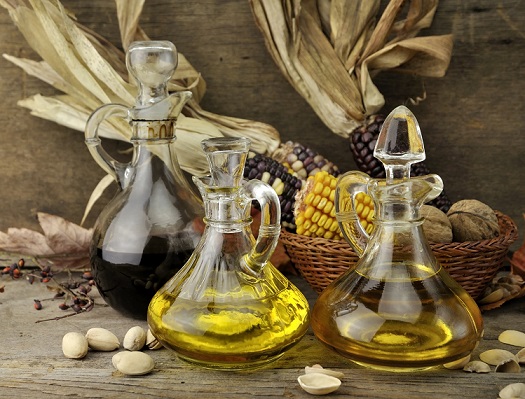 Few foods are more associated with health than olive oil. It protects your heart, and gives you a super intelligent brain. Olive oil even clears acne when eaten, thanks to its abundance of antioxidants. But when applied as a topical home remedy, olive oil turns into a horror story; it’s one of the strongest disruptors of the human skin barrier around.
Few foods are more associated with health than olive oil. It protects your heart, and gives you a super intelligent brain. Olive oil even clears acne when eaten, thanks to its abundance of antioxidants. But when applied as a topical home remedy, olive oil turns into a horror story; it’s one of the strongest disruptors of the human skin barrier around.
Olive oil is 70% oleic acid, a monounsaturated omega 9 fat. Oleic acid has been shown to increase trans-epidermal water loss (TEWL), the quantity of moisture lost through the skin’s outer layer.
Olive oil itself is known for its disruptive effect on skin barrier function, like in this study where a masseur rubbed it into a customer, only to discover a red rash on his hands. Olive oil has tons of vitamin E, but both oleic acid and olive oil are known for inflammation and irritation.
The top 6 vitamins and minerals for clearing acne forever
What’s weird is that olive oil is gaining a bad reputation for clogging skin pores too. Olive oil only has a comedogenic rating of 2 out of 5, indicating a “low” chance of it clogging pores. That’s the same score as grapeseed oil. But unlike that safe and excellent treatment, olive oil seems to be a nightmare.
If you have a bottle of olive oil in your cupboard, use it as a tasty salad dressing.
Rubbing alcohol
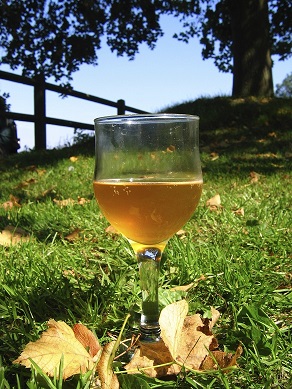 Rubbing alcohol sounds like a tempting acne weapon. If you love beer it sounds especially cool – it’s like the greatness of alcohol never ends. It’s known to burn and cause pain in wounds as a harsh way to cleanse them; could its harsh powers kill p.acnes bacteria as well?
Rubbing alcohol sounds like a tempting acne weapon. If you love beer it sounds especially cool – it’s like the greatness of alcohol never ends. It’s known to burn and cause pain in wounds as a harsh way to cleanse them; could its harsh powers kill p.acnes bacteria as well?
The answer is yes, but alcohol also leads to mass death of skin cells surrounding the edges of your pores, hence clogging those pores badly. Alcohol also irritates and burns human skin, but with the pore clogging power above, alcohol is already out of bounds.
Many distilled products such as aloe vera use alcohol as a base. Small amounts are acceptable and it depends on the topical treatment it’s coupled with, but applying alcohol by itself is too much of a blunt instrument.
When people have woken to a fresh batch of pimples every days for years, are finally fed up and looking to get clear skin once and for all, harsh treatments like alcohol are a tempting option. The same goes for white vinegar and apple cider vinegar. Overall however, rubbing alcohol is a failed home acne remedy.
Cucumber
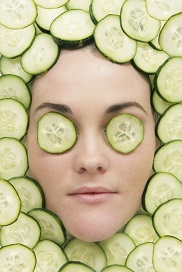 Cucumber is a perfectly healthy food and a perfectly safe topical treatment. Where it fails for acne is in its complete lack of benefits.
Cucumber is a perfectly healthy food and a perfectly safe topical treatment. Where it fails for acne is in its complete lack of benefits.
Cucumber slices are a popular face mask among women, since Chinese legends say that they can reduce eye rings, slow ageing, and even improve sleep through an unknown mechanism. The home remedy remains popular to this day, but the cucumber plant is extremely low in vitamin C, antioxidants, vitamin A, vitamin E, and smaller plant phytonutrients.
The only promising compounds are cucumber volatiles, which have antibacterial activity against various strains, and hence, maybe p.acnes bacteria. However cucumbers have few studies showing benefits for inflammation and fewer for oxidative stress. There could be hidden beneficial compounds which scientists haven’t identified yet, but that could be the case for apples, garlic, honey – any plant in existence.
There’s little risk from cucumber, aside from natural defensive toxins called cucurbitacins which are found in only low levels. However, there are so many superior home remedies (like sea salt and turmeric) that we can safely declare cucumber to be overrated.
Egg white mask
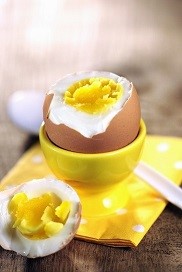 Now we have egg whites, which are similar to cucumber in that they’re safe but have few powers for acne. The idea is to apply an egg white facial mask, to calm all reddened and inflamed pimples.
Now we have egg whites, which are similar to cucumber in that they’re safe but have few powers for acne. The idea is to apply an egg white facial mask, to calm all reddened and inflamed pimples.
Eggs whites have powers unrelated to acne; they contain a skin-whitening enzyme called lysozyme which is 20 times more potent than the skin lightener kojic acid. Lysozyme also prevents browning of the skin.
The one good usage for an egg white mask is to create an even skin colour. However, they can’t actually improve acne, because for one thing, the egg white is the least nutritious part of the egg. The yolk is where the zinc, the vitamin A, the vitamin E, lutein and other carotenoids are concentrated. That’s why the colour is so rich.
Recommended – the 7 greatest natural topical treatments for acne
The egg white meanwhile, is mostly proteins, and proteins must be metabolised and reconstructed by the body first before they strengthen your skin. In other words you have to eat them.
Lysozyme can cause allergic reactions in some as well. If you’re allergic to eggs then egg white masks will inflame your pimples. This doesn’t occur often, so the final word is this – an egg white mask will not clear your acne.
Toothpaste
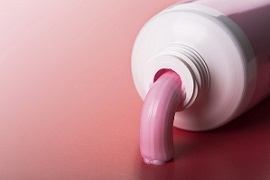 The classic home remedy! Unfortunately it’s also one of the worst home remedies.
The classic home remedy! Unfortunately it’s also one of the worst home remedies.
The tale goes that if you are afflicted with acne, then never fear, because you only have to apply a globule of toothpaste to the pimple. By the morning it will have calmed down and shrunk to a tenth of its original size.
Why would it work? Old toothpastes contained an antibacterial chemical called triclosan. The intention was to wipe out the bacteria in your mouth responsible for fizzing away at and eroding the tooth enamel. It’s possible that the triclosan is why many young women back in the 1960s or 1970s calmed their acne with toothpaste and recommended it to their kids, spreading the legend.
There’s a small snag though – triclosan has long since fallen out of favour. It destroys male hormones, it may cause cancer, and it’s an inflammatory menace. The one reason why toothpaste might have reduced acne has been eliminated from all but the most bargain basement toothpastes.
What’s more, commercial toothpaste contains an inflammatory cocktail of stabilisers, whiteners, flavourings and foaming agents. There’s also sodium fluoride, the enamel protecting agent which increases inflammation and depletes antioxidants. The verdict on toothpaste – avoid!
Flaxseed oil
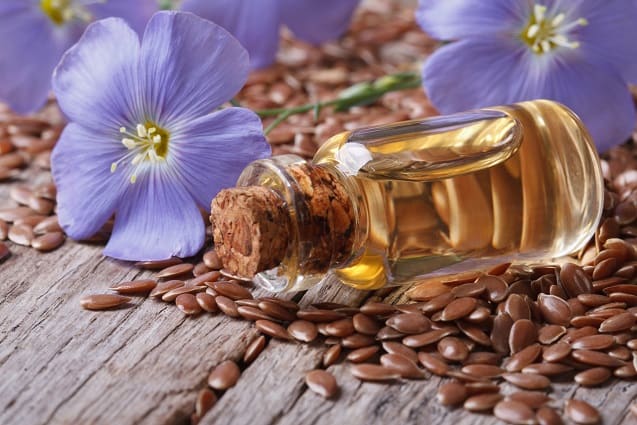 Flaxseed oil is a health supplement designed to supply a plant based omega 3 form (ALA) as opposed to the animal based omega 3s from fish (DLA). Some experimental people wondered whether flaxseed oil might work on acne topically and hence, that’s what they tried. However, flaxseed oil is only useful for acne when consumed.
Flaxseed oil is a health supplement designed to supply a plant based omega 3 form (ALA) as opposed to the animal based omega 3s from fish (DLA). Some experimental people wondered whether flaxseed oil might work on acne topically and hence, that’s what they tried. However, flaxseed oil is only useful for acne when consumed.
The debate rages on. This study concluded that while consuming the alpha linolenic acid (ALA) found in flaxseed oil could increase the skin’s defences against UV radiation, applying it topically had no benefit.
On the other hand, some argue that flaxseed oil is rich in vitamin E, and it is. With 87% of the daily allowance per 100 grams it’s only moderately lower than grapeseed oil. This study found that topical flaxseed oil increased the collagen content of rat skin, and accelerated the wound healing process.
At the end of the day however, all this debating is irrelevant. Why? Flaxseed oil has comedogenic rating of 4 out of 5, giving it a “very high” chance that it will clog your skin pores. Topical flaxseed oil has some of worst acne testimonials of any natural skincare oil. The comedogenicity is probably why.
Say no to flaxseed oil! This also illustrates a principle of clearing acne – that a healthy food is not automatically a miracle when applied topically.
Baking soda
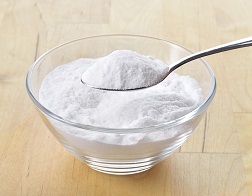 Baking soda has the exact opposite problem to lemon juice. It’s way too alkaline and will unfavourably shift your all-important skin PH balance in the opposite direction. While the ideal human skin PH for keeping bacteria minimised is 5, baking soda has a PH of 9.
Baking soda has the exact opposite problem to lemon juice. It’s way too alkaline and will unfavourably shift your all-important skin PH balance in the opposite direction. While the ideal human skin PH for keeping bacteria minimised is 5, baking soda has a PH of 9.
What are the theories about baking soda and acne? It’s said to calm the skin, pretty much. Excess acidity is believed to be the root cause of all disease by many, particularly followers of the vegan or raw food diet.
However, this study found that overly alkaline skin led to increased sensitivity to cosmetics chemicals. This study was particularly important for acne; a high skin PH was found to be a better environment for p.acnes bacteria to thrive and multiply. The first study also found that a higher skin PH led to higher transepidermal water loss of the stratum corneum, or in plain English, the skin slowly dried out.
Baking soda is a very versatile home appliance. You can use it for washing clothes, and as an old fashioned but effective solution for cleaning and slowly whitening your teeth. I use it every day. For those reasons, baking soda has the “natural” appeal, but you should never try to clear your acne with it.
Conclusion
You now know which acne home remedies have no real evidence behind them.
Your chances of clearing your acne once and for all should have increased significantly. Keep an eye out for skincare recipes involving these ingredients. Hopefully, you now understand more of the science behind acne as well.
Make no mistake that there are many excellent home remedies. Sea salt is rich in magnesium, which is known to calm the skin. Topical turmeric can supply a variety of antioxidants while cinnamon can increase collagen formation.
Finally, it’s only a matter of time before a new food, plant or oil bursts into the acne home remedy market. The lesson from this article is to always be alert and on your toes.
NEXT: read the 167 page eBook and get the ultimate diet for acne
Thanks for reading!

Hello,
How should one balance the ph of the skin? Is it ok to cleanse with a mild cleanser and moisturize or do you recommend a toner too? If so, any ingredients?
Also, any ideas for getting rid of flat, white scars and hyperpigmentation?